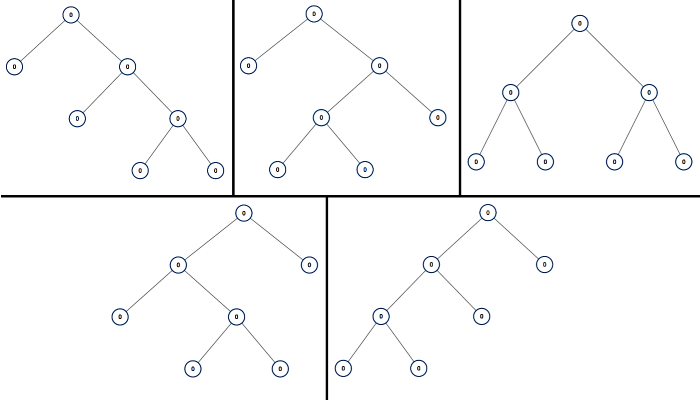Problem
Given an integer n, return **a list of all possible *full binary trees* with** n nodes. Each node of each tree in the answer must have Node.val == 0.
Each element of the answer is the root node of one possible tree. You may return the final list of trees in any order.
A full binary tree is a binary tree where each node has exactly 0 or 2 children.
Example 1:

Input: n = 7
Output: [[0,0,0,null,null,0,0,null,null,0,0],[0,0,0,null,null,0,0,0,0],[0,0,0,0,0,0,0],[0,0,0,0,0,null,null,null,null,0,0],[0,0,0,0,0,null,null,0,0]]
Example 2:
Input: n = 3
Output: [[0,0,0]]
Constraints:
1 <= n <= 20
Solution (Java)
/**
* Definition for a binary tree node.
* public class TreeNode {
* int val;
* TreeNode left;
* TreeNode right;
* TreeNode() {}
* TreeNode(int val) { this.val = val; }
* TreeNode(int val, TreeNode left, TreeNode right) {
* this.val = val;
* this.left = left;
* this.right = right;
* }
* }
*/
class Solution {
public List<TreeNode> allPossibleFBT(int n) {
if (n % 2 == 0) {
// no complete binary tree possible
return new ArrayList<>();
}
List<TreeNode>[] dp = new ArrayList[n + 1];
// form left to right
for (int i = 1; i <= n; i += 2) {
helper(i, dp);
}
return dp[n];
}
// Using tabulation
public void helper(int n, List<TreeNode>[] dp) {
if (n <= 0) {
return;
}
if (n == 1) {
dp[1] = new ArrayList<>();
dp[1].add(new TreeNode(0));
return;
}
dp[n] = new ArrayList<>();
for (int i = 1; i < n; i += 2) {
// left
for (TreeNode nodeL : dp[i]) {
// right
for (TreeNode nodeR : dp[n - i - 1]) {
// 1 node used here
TreeNode root = new TreeNode(0);
root.left = nodeL;
root.right = nodeR;
dp[n].add(root);
}
}
}
}
}
Explain:
nope.
Complexity:
- Time complexity : O(n).
- Space complexity : O(n).